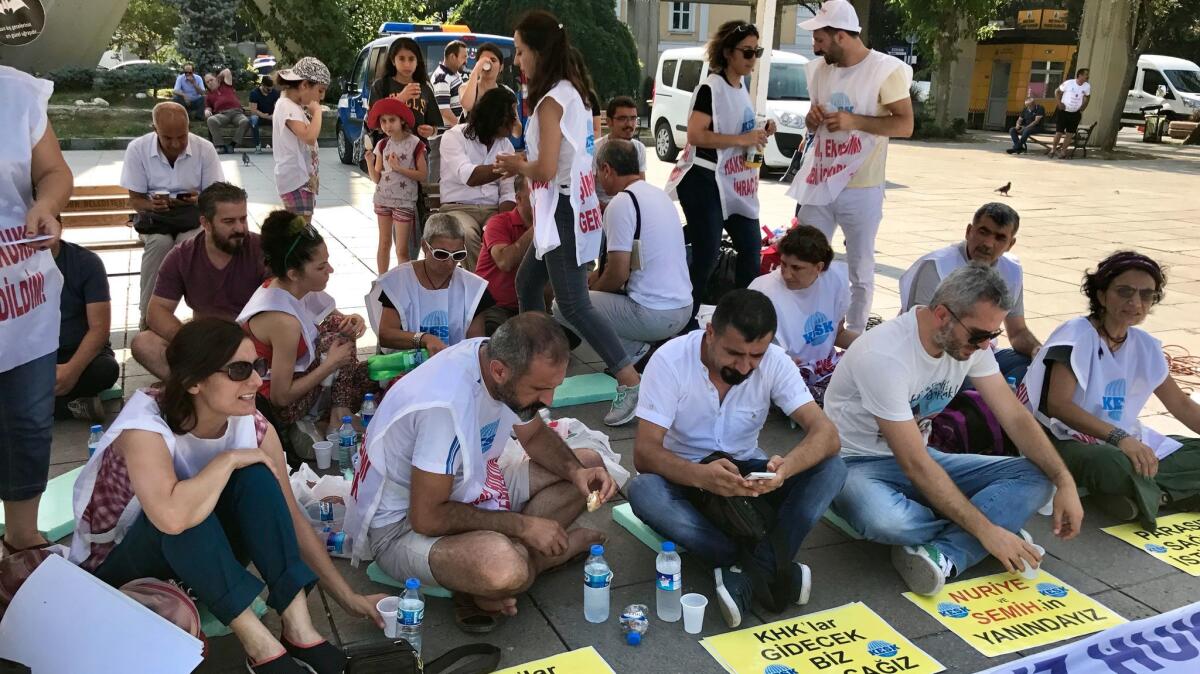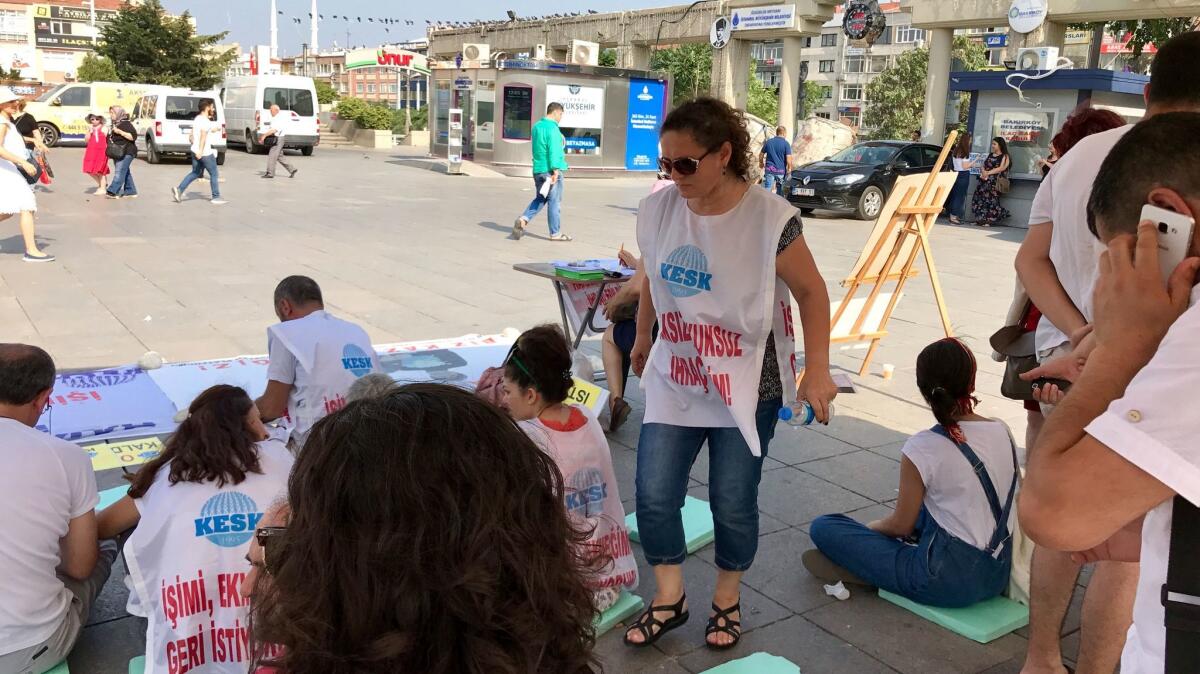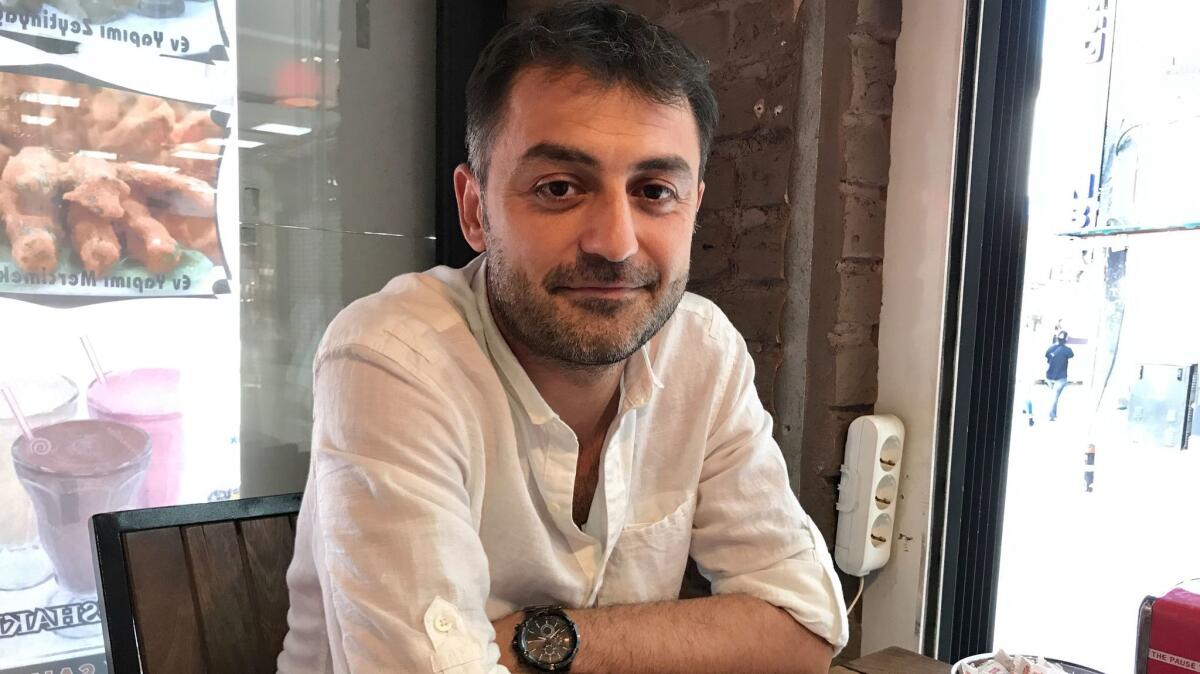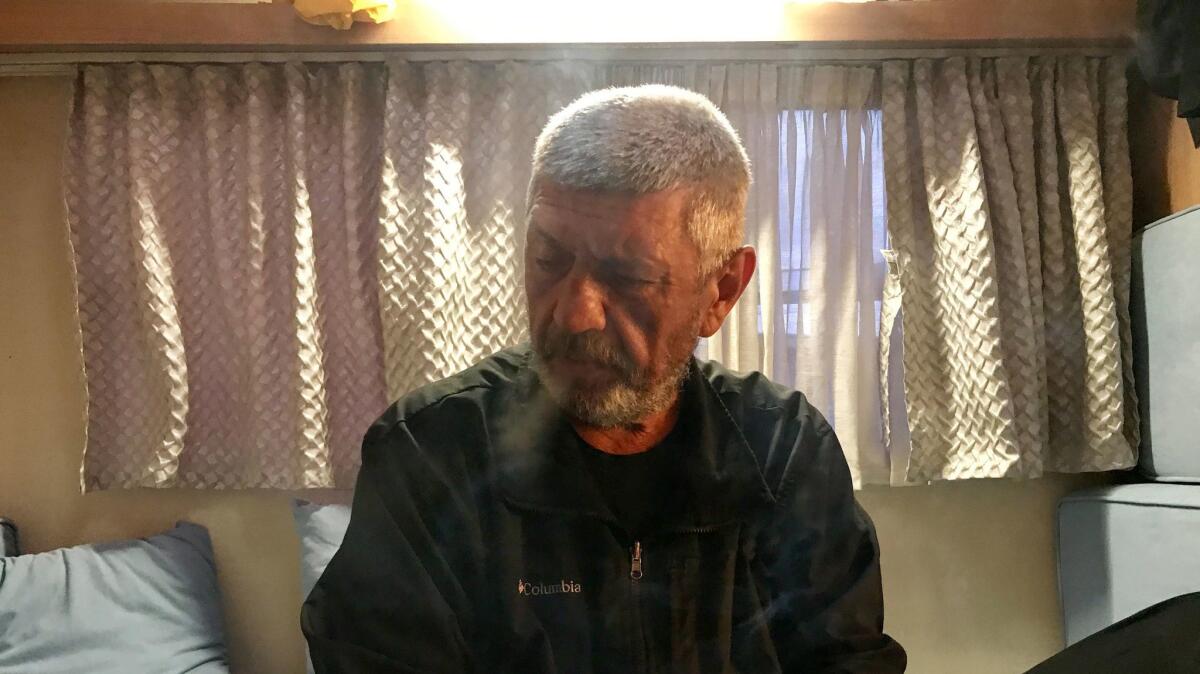Teachers, doctors, tax collectors: In Turkey’s sweeping purges, ordinary people are branded enemies of the state

Reporting from Istanbul — They gathered, as they have every few days since February, in a concrete plaza in western Istanbul beneath a large, rippling Turkish flag. Someone passed out snacks and orange soda. They donned vests, chanted slogans and danced to an old socialist song blaring from a portable speaker.
People hurried past on the way to shops or the train station, barely glancing in their direction. The group dispersed after three hours, depositing plastic cups in the trash and stashing placards in their cars.
The forlorn protest — by roughly 20 civil servants fired in a massive and continuing purge of government workers that began after last July’s failed coup in Turkey — had been all but invisible.
“We have been speaking out week after week, ” said Filiz Dogan, who was sacked after 23 years in the finance ministry’s tax office, “but they are turning a blind eye to us.”
As President Recep Tayyip Erdogan consolidates his power through a state of emergency, he has ordered the firings of more than 140,000 public-sector employees, a bureaucratic purge on a scale not seen anywhere since Stalin’s Soviet Union or Mao Tse-tung’s Cultural Revolution in China.
The targets include a broad range of people whom Erdogan’s government sees as enemies: union members, leftists, academics, police and army personnel and suspected supporters of the shadowy religious movement that authorities blame for the coup attempt. Nearly 500 alleged coup plotters went on trial beginning this week, some facing the prospect of life in prison.
The firings are announced by decree, often in batches of thousands, rippling through a vast public sector workforce of more than 3 million people. Those listed are accused of being connected to terrorist organizations, without any evidence offered.
One year after the dismissals began, many former employees who had enjoyed stable, middle-class existences are struggling to make ends meet. Unable to plead their innocence in court, they’ve been stripped of their pensions, had their passports confiscated and found that private companies are unwilling to hire them, essentially becoming outcasts in their own country.
“You have almost 150,000 purged, and if they all have two dependents and a spouse, that’s more than half a million people who are now untouchables in the Turkish context,” said Soner Cagaptay, a historian and author of “The New Sultan: Erdogan and the Crisis of Modern Turkey.”
“They have no pension, no one will hire them, they can’t even take their case to court. It’s creating a new underclass, in a way.”
The uncertainty has hardened into desperation for some who have sold their cars or homes, or taken dangerous jobs in fields such as construction, where employers ask fewer questions. Two teachers who launched a hunger strike in March to protest their firings have been jailed. Many others are forgoing healthcare and borrowing money to cover expenses.

“Our friends help us pay our bills,” said Dogan, 48, whose husband, Dursum, was fired as a tax collector on the same day last November. “We don’t buy new clothes; we’ve stopped going out to eat or to the movies. We are surviving, but barely.”
“We are prevented from existing,” said Onur Peksen, a 33-year-old high school language teacher in Istanbul, who found his name listed among more than 2,500 education ministry employees in a decree posted online late one night in February.
Since then, he said, friends of his family and parents of his former students label him a terrorist. He applied for three teaching jobs at private institutions but was rejected each time, without explanation.
“The message from the government is that we are people to be avoided,” Peksen said. “Apart from those who know us closely, people generally stay away from us.”

The firings continue. On the July 15 anniversary of the thwarted coup, Turkish authorities sacked another 7,400 civil servants, police, justice ministry officials and others.
Human rights groups say most purge victims have little hope of being reinstated because a government commission established to hear appeals under the state of emergency has just seven members and would have to discharge hundreds of decisions daily during its two-year mandate.
Amnesty International argued in a recent report that it would be nearly impossible for fired workers to defend themselves against terrorism charges since none have been informed of the evidence against them. And because the European Court of Human Rights has said it won’t hear victims’ appeals until domestic legal avenues are exhausted, the commission’s “main consequence … will likely be to delay individuals from accessing an effective remedy,” the report said.
It described their plight as “civil death.” But Erdogan has scoffed at calls for leniency.
“Why should we care?” he said in a speech on the anniversary of the coup attempt. “Will we think about them? Let them work in the private sector. Will the state look after them? The state looked after them and they betrayed the state.”
The primary targets of Erdogan’s crackdown — which has also seen tens of thousands jailed, including journalists, politicians and human rights advocates — are followers of Fethullah Gulen, the exiled cleric who allegedly orchestrated the coup attempt.
But experts say that Erdogan has used his expanded powers — fortified under the state of emergency and a referendum he narrowly won in April — to attack groups that he views as hostile to his Justice and Development Party. Those include left-wing labor unions, ethnic Kurds, secularists, a minority Muslim sect known as the Alevis and others who have historically opposed the party’s conservative Islamist agenda.
Demonizing those groups is popular with Erdogan loyalists who credit him with the economic boom that has lifted much of Turkey out of poverty over the past two decades.
Cagaptay said the country is “splitting into two halves,” with a vast segment of government supporters showing little sympathy for those harmed in the crackdown.
More than half a million people...are now untouchables in the Turkish context.
— Soner Cagaptay, author
Haydar Polat, a fired elementary school teacher, sold organic produce for a few months and then bought a liquor store with a friend in eastern Istanbul. He comes in at 2 p.m. and works behind the counter until 4 or 5 a.m.
“There are many teachers, public officials, journalist friends whose TV stations and newspapers have been closed — they come and visit me. It is a great feeling,” he said wryly. “At least we can talk about [our situation].”
Polat, 50, was not surprised when his name was listed on a decree last October. He is a longtime member of the Education and Science Workers’ Union, which has opposed government policies such as erasing evolution from high school textbooks, and a political activist who worked with the imprisoned Kurdish opposition leader Selahattin Demirtas.
Now stripped of healthcare and his pension, Polat, an asthmatic whose right arm has been crippled since birth, worries about medical bills.
“One can’t even imagine what they can do to the others if they can dismiss a peaceful person like me,” he said.
Cemile Kocaman, a statistics officer in the Istanbul municipal government, tried to find a job in Bosnia after she was fired but was stopped at the airport two months ago by authorities who said her passport had been canceled. She has had to postpone plans to marry her boyfriend, who lives in Kuwait.
Kocaman, 32, said that even international agencies were unwilling to hire her. She was close to a job with a Japanese charity recently until they learned she had been part of the purge.
“They said they liked my resume, but then they saw my ID,” Kocaman said. “Then it was like, ‘Oh, but it seems you have some problem.’ And they just stopped the whole thing. It’s clear they are afraid of the government.”
Kocaman is not a typical Erdogan critic. A self-described conservative who wears the traditional Islamic headscarf, or hijab, she had long faced discrimination from secular employers. When she was hired at the municipality in 2011, she immediately clashed with her supervisors, whom she suspected were Gulen supporters, filing a lawsuit against them for professional misconduct.
When Erdogan and Gulen, former allies, fell out in 2013, Kocaman wrote posts on social media backing the government, arguing that it had been popularly elected.
But she believes other posts in which she criticized corruption in Erdogan’s party, as well as her work for a local human rights organization, made her a target.

Cihangir Islam, an orthopedic surgeon and former member of two Islamist political parties, was fired from his university post this year after signing a letter criticizing Turkish military operations in Kurdish areas.
This summer he joined a massive antigovernment protest march, walking 250 miles from Ankara, the capital, to Istanbul, and put his medical skills to use by serving as the unofficial doctor to the 68-year-old protest leader, Kemal Kilicdaroglu.
Erdogan’s policies “are killing careers, putting black marks in databases, trying to destroy thousands of people,” Islam said. “They are trying to kill us electronically.”
Follow @SBengali on Twitter for more news from South Asia
ALSO
Get ready to rumble: Taiwan’s legislative battles feature punching, shoving and tackling
Venezuela’s attorney general seeks to halt installation of newly elected national assembly
A million miles away behind her own front door: A Saudi woman’s secret apartment
More to Read
Sign up for Essential California
The most important California stories and recommendations in your inbox every morning.
You may occasionally receive promotional content from the Los Angeles Times.











